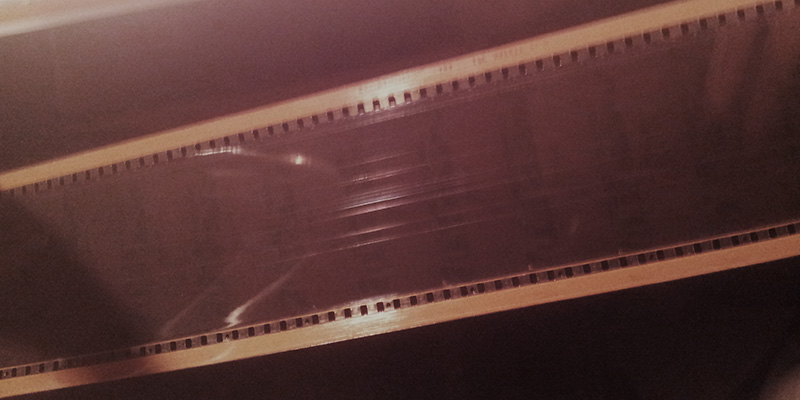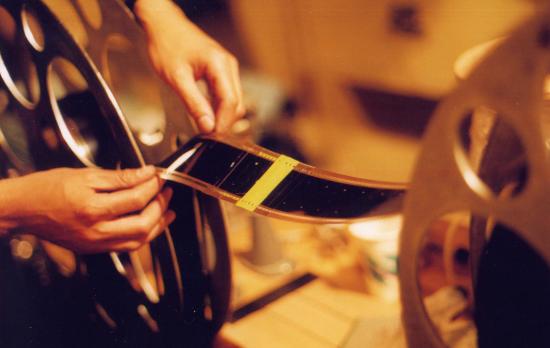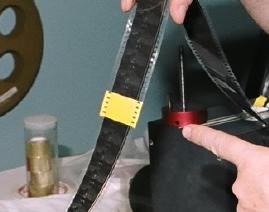|
|
This topic comprises 3 pages: 1 2 3
|
|
Author
|
Topic: film handling workshop, Austin
|
|
|
|
|
|
|
|
|
|
|
|
|
|
|
|
|
Liz Coffey
Film Handler
Posts: 4
From: Roxbury, MA USA
Registered: Jun 2007
|
 posted 08-27-2014 09:10 AM
posted 08-27-2014 09:10 AM





Thanks Michael, and sorry about that bad link!
True, Frank, I wish we had pulled this together a while ago too.
This is aimed at people who are already experienced projectionists, but who have not worked extensively with archival film.
As you no doubt are aware, many places that still want to show 35mm are running into problems finding prints to show. Many film archives have prints that can be borrowed under certain conditions, and this project is a step toward making more cinemas capable of borrowing archive prints.
It's our hope that theatres that are trying to hold onto their film projectors in addition to DCP will find this useful.
There are a lot of prints out there, and it would be a shame to just allow them to rot in storage instead of letting them out to entertain us. Sure, they won't last forever, but what will?
| IP: Logged
|
|
Leo Enticknap
Film God

Posts: 7474
From: Loma Linda, CA
Registered: Jul 2000
|
 posted 08-27-2014 11:22 AM
posted 08-27-2014 11:22 AM





quote: Liz Coffey
This is aimed at people who are already experienced projectionists, but who have not worked extensively with archival film.
In that case I tend to agree with Frank that it's going to be an uphill struggle.
This is a 70mm print of The Untouchables I showed on Monday:

We (as in, the American Cinematheque - I didn't work there at the time) last played that print in 2012, and the condition report from that screening describes it as being in near-perfect condition. In other words, those scratches weren't there then. The fact that they are now is significant for two reasons.
1. It's 70mm. Because there are so few 70mm prints that are now left in circulation, distributors and archives tend to be even more cagey about where they go than with 35. The fact that in the last two years, a 70mm house still did this to the print, in spite of the gatekeeping that now exists, shows us what we're up against. Frankly, I was very shocked to see this sort of damage. Until relatively recently, 35mm was a crapshoot because the prints - especially the ones from smaller rep distributors - will have gone to anywhere that would book them, including university film societies, places on a shoestring budget that couldn't afford decent maintenance, etc. etc. But 70mm, as a general rule, only went to relatively well-resourced theaters and was only handled by professionals. What I found on Monday is clear evidence that this rule of thumb is not true anymore. And then there's The Master - proof that film's not dead, etc. etc. etc. Most of the 70mm prints were damaged within a few passes, including the one in London on its very first show, so much so that the scratch was commented on in national press coverage, by a critic who thought that this was part of the natural charm of the analog medium!
2. The pattern and intensity of the vertical (in relation to the frame) scratches varies from reel to reel. In particular, the scratches are a lot worse (including a gnarly green one in the second half of reel 1, where the emulsion has been gouged away) in reels 1-3-5 than in 2-4-6. Therefore, this damage was done at a changeover house, and is yet more evidence that the traditional archive mantra of "no platters, and everything will be OK" is simply untrue.
Spending a day teaching projectionists not to cut heads and tails and to look for changeover dots is not going to prevent this sort of damage from happening. Most crucially, you need the mindset that inflicting that sort of damage is unacceptable and the belief that it's worth investing time and care to avoid doing so. It's not rocket science, but it does require a certain level of attention to detail and consistency (i.e. working in a high pressure, "no second chances" situation: once you've made the error and scratched the print, it can't be undone) that basically, either you're willing to aim for or you're not. But after that, equipment maintenance is probably more important than film handling skills: winding and threading a film without scratching it is something that an experienced projectionist who has not worked with archive prints should be able to do. If (s)he can't or won't, that person is not a fit and proper person to be let loose on archive prints, however much training you give them.
Therefore, if the focus of this day is going to be on educating managers and curatorial staff that they are going to need to have people who can align reflectors, maintain airflow and cooling systems, replace worn sprockets and pad rollers, keep mechanisms properly lubricated, keep film path components properly aligned and clean, maintain and adjust appropriate gate pressure, etc. etc., then it's a good idea, because they'll come away with a realistic expectation of what they need to achieve (or more accurately, facilitate the achievement of) than they will be reading "film forever" cheerleading type stuff.
But any experienced projectionist who can't do this stuff is already a lost cause. The only specific archival training for a projectionist who already has significant experience in the basics I can think of is in identifying and playing legacy aspect ratios and audio formats.
| IP: Logged
|
|
|
|
|
|
|
|
Leo Enticknap
Film God

Posts: 7474
From: Loma Linda, CA
Registered: Jul 2000
|
 posted 08-27-2014 08:31 PM
posted 08-27-2014 08:31 PM





Your explanation is the only one that makes sense in explaining how this print got this badly damaged. In my past experience, 70mm prints from as far back as the early '80s tended to be in very good condition relative to the 35mm copies of the same title floating around, because 70mm houses demanded more from their projectionists in terms of skills, experience and pride in their work. But this clearly isn't the case now, or else that print wouldn't have got that way.
I am wondering if a botched 35-70 conversion might have been done here, though, because the scratches are in two areas: in the middle of the frame and near one edge. Maybe a 35mm component should have been removed from the film path but wasn't, and this caused the center scratching and pushed the edge such that it rubbed against something it shouldn't have nearby?
quote: Brad Miller
And as nice of an idea as this workshop is, it won't change anything. It's just TSA for changeovers, to give people a false sense of security in thinking that all is perfect and wonderful out there.
If that's what they're going to do (and I note that no detail on what they're covering and what not has been published as yet), I agree entirely; hence my point is that if they're going to focus this day on educating the people who will ultimately sign the checks to keep archival projectionists in work and their equipment working as to why those checks will need to be as big as they will be, then it might achieve something useful. But if, as you say, they're going to spend a day saying "Throw your splicer in the trash and watch for the little black blobs every 20 minutes", I fear that it'll be a futile exercise.
| IP: Logged
|
|
|
|
|
|
All times are Central (GMT -6:00)
|
This topic comprises 3 pages: 1 2 3
|
Powered by Infopop Corporation
UBB.classicTM
6.3.1.2
The Film-Tech Forums are designed for various members related to the cinema industry to express their opinions, viewpoints and testimonials on various products, services and events based upon speculation, personal knowledge and factual information through use, therefore all views represented here allow no liability upon the publishers of this web site and the owners of said views assume no liability for any ill will resulting from these postings. The posts made here are for educational as well as entertainment purposes and as such anyone viewing this portion of the website must accept these views as statements of the author of that opinion
and agrees to release the authors from any and all liability.
|

 Home
Home
 Products
Products
 Store
Store
 Forum
Forum
 Warehouse
Warehouse
 Contact Us
Contact Us




 Printer-friendly view of this topic
Printer-friendly view of this topic












![[Eek!]](eek.gif) The yellow tape was, admittedly, fixable, but anyone who is running 70mm should be smart enough not to use it.
The yellow tape was, admittedly, fixable, but anyone who is running 70mm should be smart enough not to use it.





